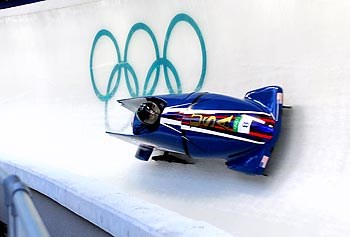Professors Predict Colder, Snowier Weather for Olympic Games in Russia

The bobsled is a popular outdoor sliding competition during the Winter Olympic Games.
01/21/2014
By Edwin L. Aguirre
With the (http://www.sochi2014.com/en) XXII Olympic Winter Games on the horizon, one of the questions in the minds of athletes, organizers and spectators is what the weather will be in Sochi, Russia.
“Snow cover in November and December was well above normal,” says Prof. Frank Colby of the Department of Environmental, Earth and Atmospheric Sciences (EEAS). “Recent weather in the region has been warmer than usual, but the long-term trends suggest colder, snowier weather will make an appearance in the next few weeks.”
Fellow EEAS professor Mathew Barlow agrees. “Based on our work on Siberian snow cover, there are increased odds for below-average temperatures and above-average precipitation during the games — so, hopefully, good snow,” he says.
Adds Colby: “One source says that there might even be more snow than is desired, with a worry about avalanches.”
A Black Sea Resort
The games at Sochi will be held primarily in two locations: along the coast in the Imeretinskaya Valley for the indoor ice events and in the Krasnaya Polyana Mountains for the skiing and sliding events.
“Sochi, located at nearly the same latitude as Lowell — 43.5° north, compared to 42.6° north for Lowell — is a Black Sea resort, and as such, has a very mild climate along the coastal region,” notes Colby. “Typical February weather has high temperatures near 50° F and low temperatures in the upper 30s. The days will be reasonably long, featuring 10 to 11 hours of daylight, but the skies are typically cloudy much of the month. Some kind of precipitation falls nearly 60 percent of the days in February, almost always in the form of rain.”
The mountains to the north are home to Russia’s primary winter resorts, only 30 miles from the coast.
“The vertical drop available for skiing and sliding is more than 5,000 feet, making it similar to that at Whistler Blackcomb alpine resort in British Columbia, where the 2010 Winter Olympics were held,” says Colby. “Indeed, the climates of the two locations are quite similar, with very mild, humid conditions at sea level and lots of snow in the mountains.”
Whims of Nature
History is full of examples of weather wreaking havoc even to best-laid plans:
- During the 1928 games in St. Moritz, Switzerland, the opening ceremony was held in a blizzard while unseasonably warm weather conditions plagued the rest of the games, forcing the 10,000-meter speed-skating event to be cancelled.
- During the 1932 Winter Olympics in Lake Placid, N.Y., virtually no snow fell for two months before the start of the games, and it was not until mid-January that there was enough snow to hold all the events.
- In the 1964 Winter Olympics in Innsbruck, warm weather caused a lack of snow during the games and the Austrian army was tasked to transport snow and ice to the sport venues.
- During the 2010 Games in Vancouver, a historically warm January forced organizers to import snow using trucks and helicopters to cover Cypress Mountain, site of the snowboard and freestyle skiing events.
